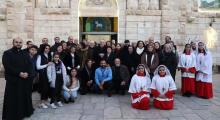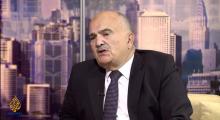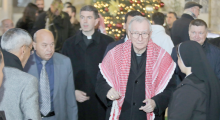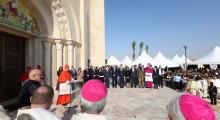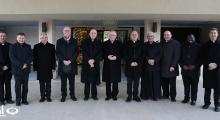Issued by the Catholic Center for Studies and Media - Jordan. Editor-in-chief Fr. Rif'at Bader - موقع أبونا abouna.org
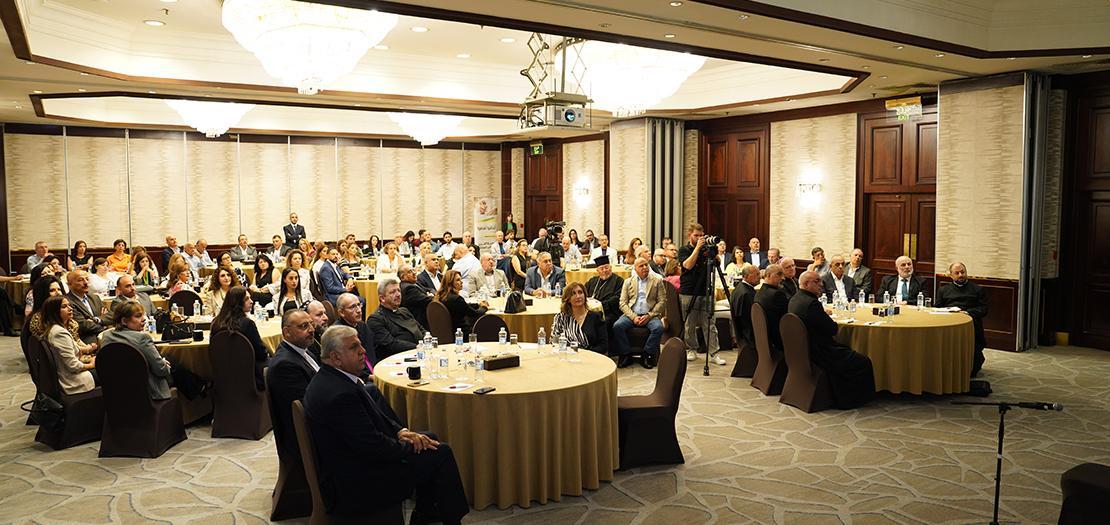
Under the patronage of Cardinal Pierbattista Pizzaballa, Latin Patriarch of Jerusalem, the General Administration of Latin Patriarchate Schools in Jordan on Saturday, August 17, 2024 held the first meeting of business partners with the aim of enhancing cooperation and establishing a fruitful partnership that bolsters educational initiatives and contributes to the development of schools and society.
The participants in the meeting included General Vicar for Jerusalem Bishop William Shomali who deputized for Cardinal Pizzaballa, Acting Latin Patriarchal Vicar for Jordan Fr. Jihad Shweihat, General Director of the Latin Patriarchate Schools in Jordan Fr. Firas Nasrawin, a group of priests, along with a number of Jordanian businessmen and representatives of various Christian institutions, local associations, and members of the local community.
During the meeting, a video was screened in which Cardinal Pizzaballa stresses the importance of having a vision regarding how to give future generations in Jordan educational opportunities similar to those that were provided in the past, taking into account the current changes and rapid developments. Then, Mrs. Rania Al-Maliki gave a presentation of the strategic plan for the Latin Patriarchate schools in Jordan, which was followed by the participants' presentation of proposals for the advancement of the schools' services and mission within the Jordanian society.
Then, Bishop William Shomali delivered an address during which he stressed that Christian schools are indispensable as they provide the society with men and women who are scientifically, religiously, and morally competent. He said that education is a weapon that effects changes in the world, builds personalities, and frees people from ignorance.
Pointing out that the Latin Patriarchate schools have a non-profit status that receive students from all groups and social classes., he said that the Latin Patriarchate provides monthly financial aid to cover part of the financial deficit of these schools which also include construction, maintenance and continuous modernization projects, which are important to keep pace with development in all fields. He also called for supporting schools, not only financially, but morally by presenting suggestions based on experience for the advancement of these schools.
For his part, Fr. Shweihat said that the Latin Patriarchate has a religious, educational, and social mission where its goal has never been based on financial aspects, but rather on sacrifice and benevolence. He said that despite the political and economic challenges that have been prevailing over the past decades, the Latin Patriarchate continues its educational mission relying in the first place on the Divine Providence, as well as on the Equestrian Order of the Holy Sepulcher and philanthropists.
He continued that since the re-establishment of the Latin Patriarchate in 1847, more than 300 priests have participated in education, and thanked thousands of teachers for their participation in this effort. He said: Although the patriarchate schools have been led by patriarchs and bishops, yet they need creative people and intellectuals so that we can jointly work to organize the educational process.
On the other hand, Fr. Nasrawin touched on the major vision of this meeting, namely the importance of the Christian presence and its entrenchment in the Holy Land as well as in Jordan in particular. He said that after the re-establishment of the Latin Patriarchate, it built and rehabilitated homes, then built schools, and finally build churches, which provides evidence of its belief in the importance of cognitive development being shouldered for more than 160 years since the building of the first school in Salt in 1866 until the building of the last school in the town of Al-Wasiya, Karak, in 2000.
He indicated that the second goal of the meeting is to form a social network of friends, partners, and supporters who believe in the Latin Patriarchate Schools' educational and pedagogical mission, and their role in attaining the goodness for the Jordanian society in general.


